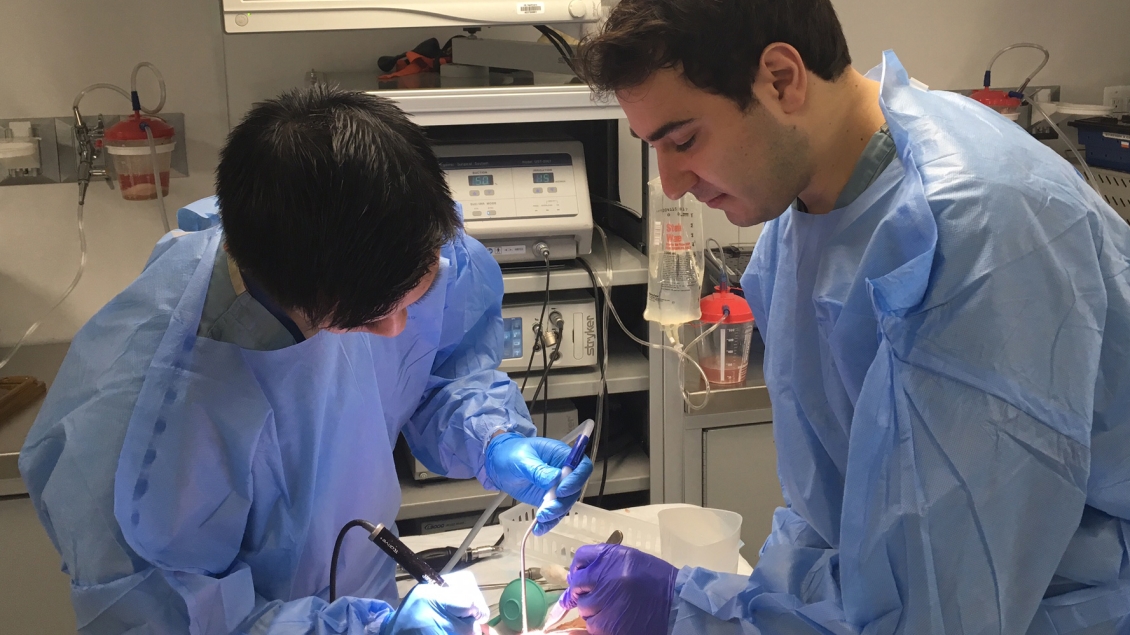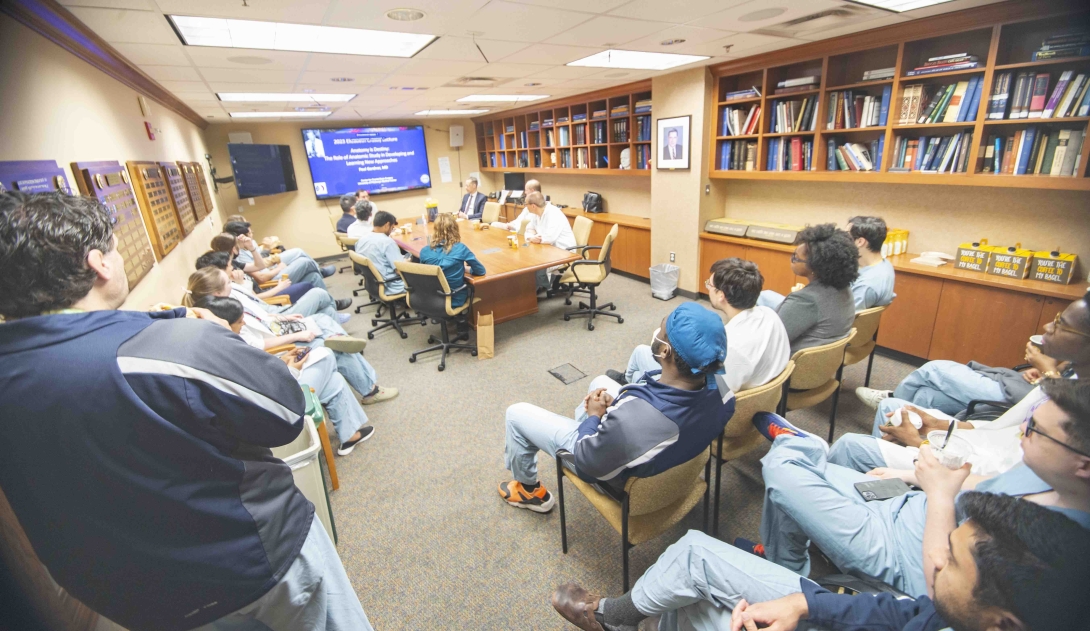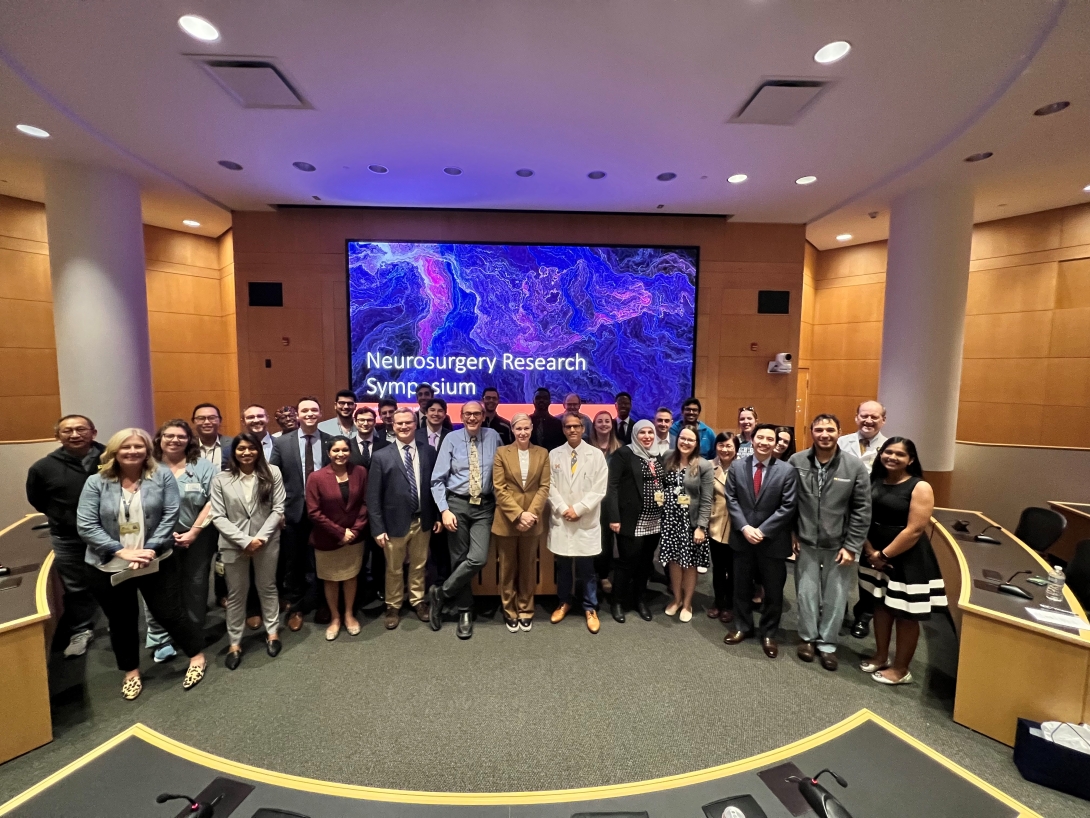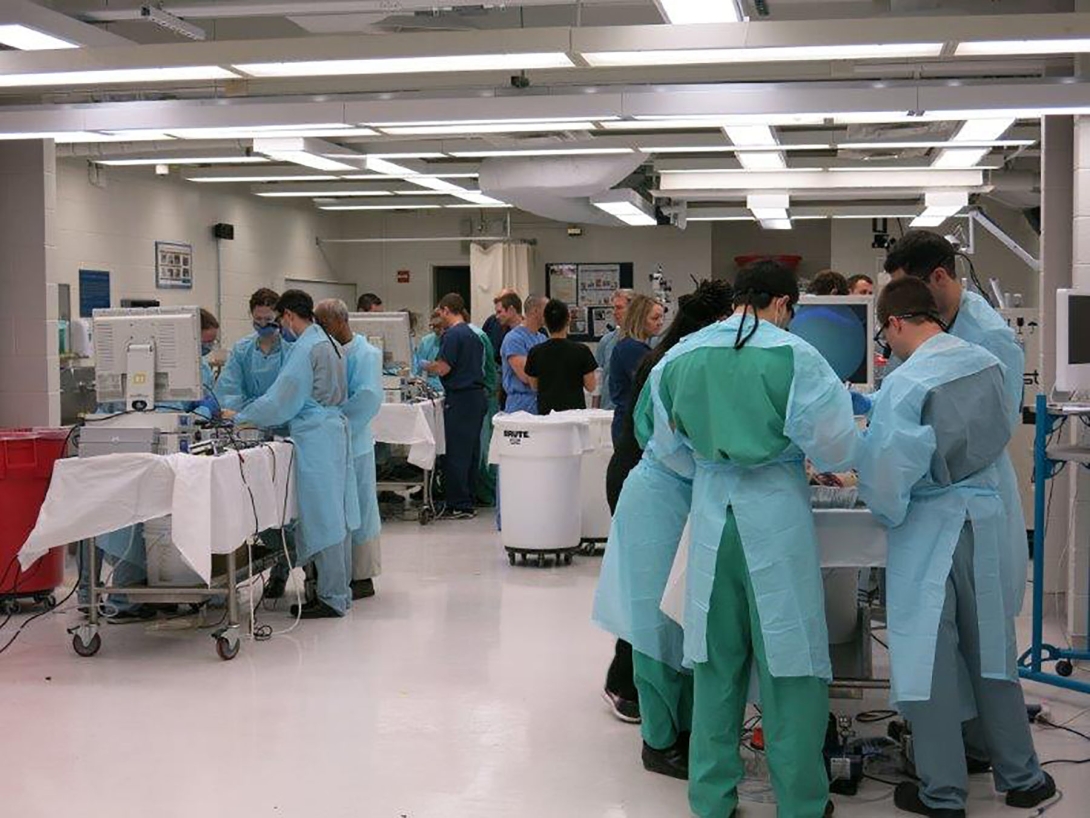
Residents at the U-M Medical School Department of Neurosurgery have the opportunity to participate in a multitude of educational activities throughout the course of their time in our program. A number of these activities are described below.
- Courses & Meetings
- Conferences & Grand Rounds
- Neuroscience Day
- Neurosurgery Residents Research Symposium
- Anatomical Education
- Michigan-Ohio State Neuroanatomy Course
- Visiting Lectureships
- Neuroscientist Training Program
The Department of Neurosurgery provides full support for residents to attend the following courses/meetings:
- Research Update in Neuroscience for Neurosurgeons (RUNN) course in Woods Hole, MA
- Kranzler Board Review Course
- CNS and AANS annual meetings
- Michigan Association of Neurological Surgeons (MANS) meeting
- Annual Neurosurgery Resident Research Symposium (see below for details)
- Michigan-Ohio State Neuroanatomy Course (see below for details)
- Residents may also attend select courses throughout the year that cater to their individual interests within neurosurgery.
- Brain Tumor Board
Fridays, 7am, via ZOOM - Clinicopathological Correlation Conference
3rd Thursdays of each month, 7-8am, Neurosurgery Conference Room (Taubman 3898) - Morbidity and Mortality Conference
2nd Thursdays of each month, 7-9am, Neurosurgery Conference Room (Taubman 3898) - Neuro-Oncology
1st Mondays, 5pm, Neurosurgery Conference Room (Taubman 3898) - Resident Teaching Conferences
1st, 4th, and 5th Thursdays of each month, 7-9am, Neurosurgery Conference Room (Taubman 3898) - Journal Club
Monthly, Neurosurgery Conference Room (Taubman 3898)

Also occurring in May each year, the Departments of Neurosurgery and Neurology co-sponsor “Neuroscience Day,” which provides residents a forum to present original research. The Neurosurgery residents have a very strong tradition of winning (cash) prizes for their work presented.
Our educational mission is to train highly skilled neurosurgeons with a strong background in clinical neurosurgery and research. We equip our neurosurgical residents with excellent clinical skills, stimulate their interest in teaching and research, demonstrate the relevance and enjoyment of continuing education, and provide them the skills and judgment to practice neurosurgery safely and competently.
The Neurosurgery Resident Research Symposium was established to stimulate and promote our residents’ academic productivity and to bring together research and clinical colleagues in neurosurgery. Each year in the spring, residents present their research at this gathering and awards are given to the residents with the best clinical and best basic science presentations. Additionally, a nationally-renowned neurosurgeon is invited each year to deliver the keynote address and help judge the presentations.

A cadaver laboratory for instruction in neurosurgical anatomy was established in 2000 at the VA Hospital, in order to allow residents hands-on instruction in surgical approaches. In this laboratory, each resident dissects a cadaver head and neck for the purpose of practicing standard neurosurgical approaches, typically during the VA rotation.
Procedures include anterior and posterior approaches to the cervical spine, pterional craniotomy, cavernous sinus approaches, midline posterior fossa procedures (including access by the supracerebellar route to the pineal), and retrosigmoid operations. Time permitting, dissections also include the skullbase, transcallosal, and bifrontal procedures. Standard surgical tools and equipment are used in these dissections, including an operating microscope, drills, etc.
The neurosurgical anatomy curriculum includes a didactic talk prior to each dissection with emphasis on the relevant clinical and surgical anatomy. Talks during this rotation also include didactic sessions on brain and spinal cord anatomy, CSF, cerebral blood flow, etc., with the appropriate physiology involved. In 2013, the neurosurgical anatomy laboratory moved to the Department of Anatomy at the Medical School.
As an adjunct to the hands-on anatomy laboratory, one of our recent graduates, Dr. Luis Savastano, performed high-quality brain and spinal cord dissections in latex-injected specimens for both research and didactic purposes. These beautifully preserved specimens complement the rich surgical anatomy experience within the neurosurgical residency.
Each year, Neurosurgery residents also have the opportunity to get together with neurosurgery residents from rival Ohio State University for the Neuroanatomy Course. This intensive course offers residents a great mix of medical education and hands-on surgical training. The location of the course alternates each year between Ann Arbor and Columbus.


Several times throughout the year, the U-M Medical School Department of Neurosurgery welcomes invited guest speakers and lecturers to present on a variety of neurosurgery-specific topics.
Elizabeth Crosby Visiting Lecture:
- Paul A. Gardner, MD, University of Pittsburgh Medical Center
- Anatomy is Destiny: The basis for development of a new surgical approach
- Innovation in Surgery
Saeed Farhat Visiting Lecture
- J.C. Leveque, MD, Virginia Mason Medical Center
- The economics of surgical appropriateness - Safety comes at what cost and to whom?
- Redefining risk in surgical decision-making
Julian T. Hoff Visiting Lecture
- John H. Shin, MD, Massachusetts General Hospital, Harvard Medical School
- The Value of Multidisciplinary Collaboration in Spine Oncology
Edgar Kahn Visiting Lecture
- Pascal M. Jabbour, MD, Thomas Jefferson University Hospital
- “Supersubspecialization” in Neurosurgery: The Vascular Paradigm – A Double-Edge Sword
- Challenges in Stroke Treatment : Playing in Synchrony
James Taren Visiting Lecture
- Charles Y. Liu, MD, PhD, University of Southern California Keck School of Medicine
- Neurorestoration - A New Synthesis (Repair, Replace, Optimize)
Joan Venes Visiting Lecture (also the Resident Research Symposium lecture)
- Jennifer Strahle, MD, Washington University and St. Louis Children’s Hospital
- The CSF-brain axis: Insights into pediatric neurosurgical diseases
Special Lectures
- Joseph "Jody" Stern, MD, Carolina Neurosurgery and Spine Associates & UNC School of Medicine
- Why should a neurosurgeon train in palliative care?
- Preventing injury in neurosurgery: Surgeon safety and ergonomics.
- Nicholas Boulis, Emory University School of Medicine
- Molecular and cellular spinal cord surgeries
- Trying to be a neurosurgeon/scientist
The Departments of Neurology, Neurosurgery, and Pathology sponsor residency tracks incorporating significant time for neuroscience research activities. Supported by an R25 grant from the National Institutes of Neurologic Disease and Stroke NINDS/NIH), the UM Clinical Neuroscientist Training Program (UMCNTP) facilitates the development of neurologist, neurosurgeon, or neuropathologist physician-scientists pursuing either laboratory-based or clinical research. Designed for individuals with significant prior research experience, the UMCNTP offers two years of mentored research experience during residency and/or incorporating an immediate post-residency year in an outstanding research environment. The goal of the UMCNTP is to accelerate participant progress towards an independent career.
Interested applicants should contact the UMCNTP Program Director, Roger Albin, MD.